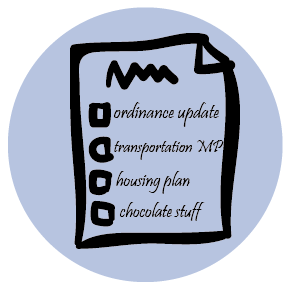Good and Bad RFPs for Planning
November 24th, 2019
 I do a lot of the grocery shopping at my house. I do it mostly because I never want to run out of chocolate, but also because I never want the greatest hits of Kenny G, Wham, and Whitney Houston to stop looping in my head. I’ve been doing this for years, but only recently started to understand that when my wife puts something on the list, she wants the thing that is on the list. I’ve learned that if the list says “cage-free, non-GMO, grass-fed, purple carrots”, then I shouldn’t even come home unless that is what I get. (Apparently, the orange ones are poison unfit for human consumption).
I do a lot of the grocery shopping at my house. I do it mostly because I never want to run out of chocolate, but also because I never want the greatest hits of Kenny G, Wham, and Whitney Houston to stop looping in my head. I’ve been doing this for years, but only recently started to understand that when my wife puts something on the list, she wants the thing that is on the list. I’ve learned that if the list says “cage-free, non-GMO, grass-fed, purple carrots”, then I shouldn’t even come home unless that is what I get. (Apparently, the orange ones are poison unfit for human consumption).
The same principle holds true for contracts and procurement. As usual, I learned this the hard way. I’ve been on both sides of the contracting process and in both cases, I’ve taken for granted how important a well-written RFP is to a project. In some of my first efforts on the advertising side, I instinctively assumed that the contractors would understand my details if I provided the general overview. And in some of my first efforts on the responding side, I have assumed that the advertiser knew that I understood their project and that could do it. The solution in both cases was to not take for granted anything in the written communication.
The most important principle to keep in mind (and/or to teach purchasing agents about) is that planning is a unique type of work. It is not like other contracts a city or county might advertise. Planning is different than engineering, (or law, or IT, or accounting). In an ‘engineering’ project, the contractor tells the client when the project is done. However, because planning this so iterative, the client decides when the plan is done.
Specifically, when I am reviewing a contract today, I look for a few potential problem areas:
- What is the problem that needs to be solved? What is the agency’s end-result? What does the ROI look like to the agency?
- Who am I working for? Is there a disconnect in who I will I be reporting to? Who evaluates customer satisfaction, the actual contract holder (i.e. Commissioners) or someone else (i.e. staff)? Is there an agency representative at all?
- How does the contractor get paid? Are they offering a lump sum or hourly compensation? How much travel and other overhead do I need to budget for? Will the agency let me submit an invoice and satisfaction survey at the 30-60-90 100% milestones?
- How does the project end? What does the finish line look like, really? Am I going to get stuck in an endless loop of revisions? Am I finished when a final draft is accepted by staff, or does it need to go through a political process?
Getting help on planning projects is usually a good idea, but it has to be a win-win arrangement. In contracting, you get what you pay for, and everyone gets more when the expectations are clearly defined.
